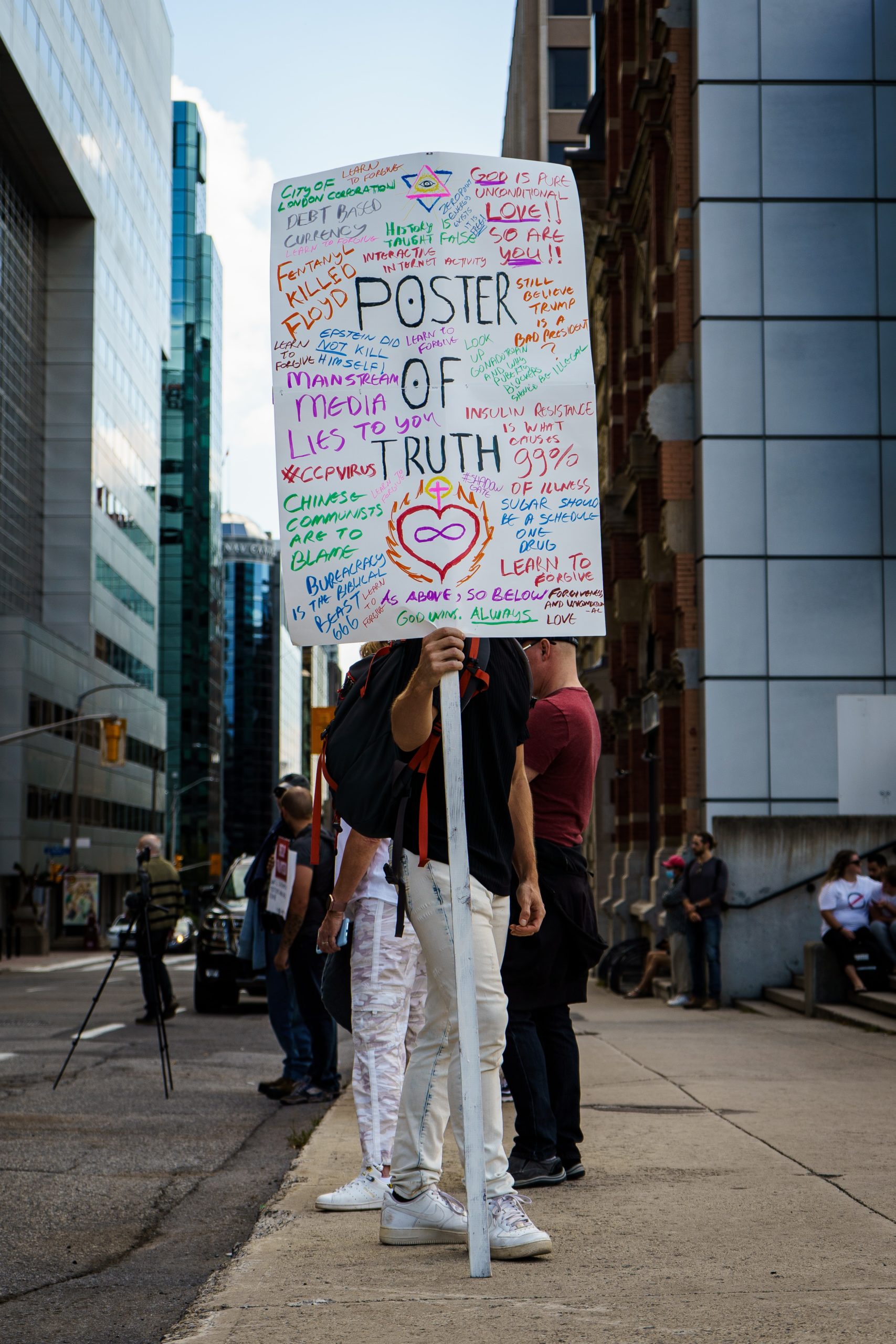[Written by Beatrice Crawford (she/her)]
[Photo by Tom Carnegie on Unsplash]
Content Warning: Mention of sexual assault and paedophilia
If there’s one thing we can all agree on in 2020, it’s the fact that none of us have a clue what is going on. The current Covid-19 pandemic is constantly evolving, with new developments and restrictions seeming to crop up every day. Governmental fumbles in the handling of the pandemic have been sowing seeds of distrust amongst the general public and the climate crisis is still barrelling on, casting clouds of uncertainty over our collective future. With all of this uncertainty and distrust, there seems to be a perfect breeding ground for conspiracy theories.
Everyone has probably heard the term ‘conspiracy theory’ before. Formally defined as ‘a belief that an event or situation is the result of a secret plan made by powerful people’, conspiracy theories have been around for most of human history. Were the pyramids built by aliens? Who really shot JFK in 1963? Was Avril Lavigne replaced by a doppelganger named Melissa in the early 2000s? Some younger people may remember the popularity of conspiracy theories on YouTube in the past few years. Content creators like Shane Dawson gained tens of millions of views on videos retelling and dissecting popular conspiracies. Most seem to have been born out of situations where things didn’t necessarily line up or the situation was somewhat suppressed by governing bodies; others were outright insane (is the Queen really a lizard person?). And, while these can be comically absurd — I highly recommend searching ‘flat earthers on This Morning’ into YouTube if you want a good laugh — there has, especially in recent years, been a more sinister undercurrent to popular conspiracy theories.
Think about the conspiracies surrounding 5G, which the UK government have deemed a ‘crackpot conspiracy’ — a small minority of people were so convinced that the technology caused the coronavirus pandemic, that they set several 5G towers across the country on fire in the early spring. Of course, the claims that 5G signals originally caused the virus, or that the pandemic was some sort of government ploy to cover up alleged health risks related to the networks, have no scientific evidence to back them up. Other popular conspiracy across the pond are QAnon and Pizzagate, generally far-right theories which believe that an overwhelming majority of (primarily left-leaning) high-profile celebrities and public figures are involved in paedophilic human trafficking rings. The FBI deemed this unproven theory so dangerous to society that they described it as a domestic terrorism threat. And in recent months, anti-vaccination (or ‘anti-vax’) theories have been given a spotlight in the media for their very real and serious risk to global public health. While anti-vax sentiments have been bubbling under the surface for years — including unfounded claims that they can cause autism — with Covid-19 vaccines being announced globally, their threat to society now feels more real than ever.
Apparently, more than 1 in 8 Britons believe that the pandemic is part of a global forced vaccination programme, something drummed up in a lab or over-exaggerated by governing bodies in order to inject us all with something. Some theorists believe the upcoming Covid-19 vaccine will be a means of inserting microchips into us all, of altering our DNA, or even of genocide. Despite recent pushes for more restrictions on such content, social media has become a breeding ground for theories like this; a quick Facebook search leads to countless groups and pages for ‘vaccine injury stories’ and ‘mums against vax’. Covid-19 has helped to create a perfect storm, of sorts, for conspiracy theorists who believe these unfounded notions — millions of people across the country spend more time at home and online, without much social interaction. They want quick and easy answers for the world’s troubles, which ultimately leads them to platforms founded on falsehoods. While the sheer ludicrousness of such theories can at times seem entertaining, it’s worthwhile putting their threats into perspective. Almost a third of Britons are at least uncertain about getting, some even outright refusing to get, a Covid-19 vaccine once it becomes available to them which could end up risking the effectiveness of it.
It’s an uncertain time for us all, and it will continue to be for a while. While our perceived powerlessness in the current circumstances may prompt us to search for any answers we can find amongst all of the turmoil, it’s still important for us to remain vigilant with what we’re seeing online. Question authority, yes. Drunk-debate with your friends whether or not we’re all secretly characters in a massive game of Sims, sure. But the threat of ‘conspiracy culture’, especially in such a volatile year, should never be underestimated.

